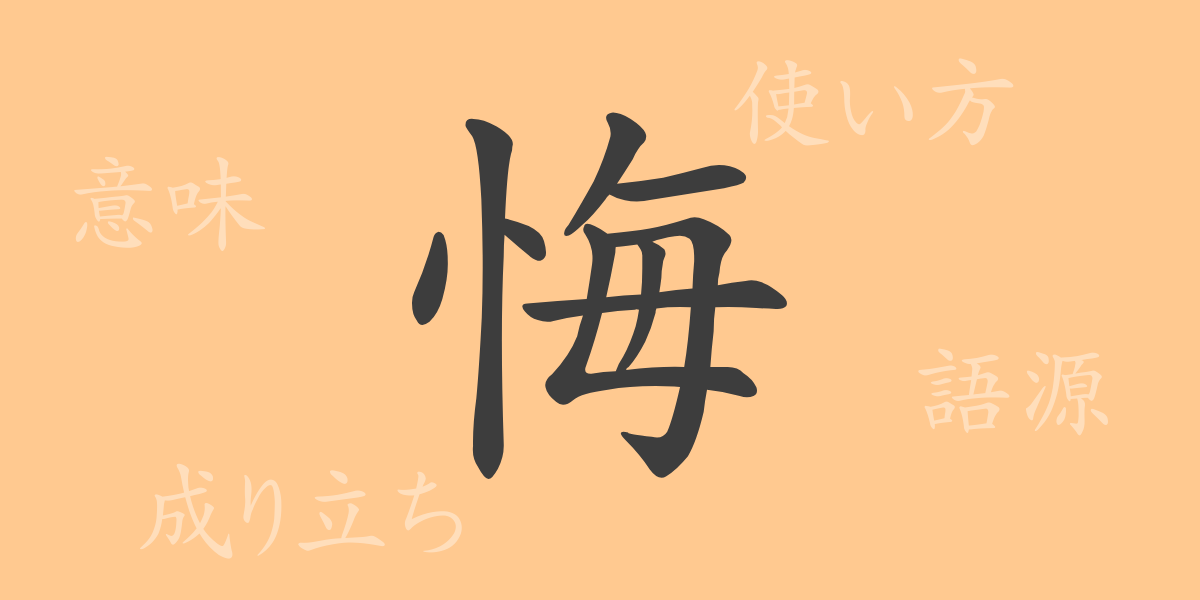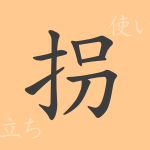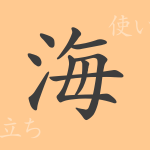Language is a mirror reflecting culture, and each character carries a deep history and meaning. The Japanese Kanji “悔” (Kui) is no exception. “後悔” (kōkai, regret), “悔やみ” (kuyami, mourning), “悔しい” (kuyashii, frustrating)… What background does the common character “悔” have in these words? In this article, we delve deeply into the origins of the Kanji “悔,” its meaning, usage, and even phrases and idioms it appears in. Join us on a journey to discover the profound depths of language.
The Origins (Etymology) of 悔
The Kanji “悔” traces back to ancient China. Derived from pictographs, this character originally combined the symbol for heart “心” (Shin) with the symbol for change “毎” (Mai), representing the emotion of regret or a change of heart. Over time, this character made its way to Japan and became used within the unique context of Japanese culture.
The Meaning and Usage of 悔
“悔” conveys the feeling of regret, but its meaning is not limited to that. It also encompasses the complex emotion of grieving or reflecting on one’s actions or mistakes. In Japanese, it is used in various expressions like “悔しい” (Kuyashii, frustrating), “悔やむ” (Kuyamu, to mourn), and “悔いる” (Kuiru, to regret), each conveying subtly different emotions.
How to Read 悔, Stroke Count, and Radical
How is the Kanji “悔” used in Japanese, and what features does it have?
- Readings: The on’yomi (Sino-Japanese reading) is “かい” (Kai), while the kun’yomi (native Japanese reading) are “くい.る” (Kui-ru), “くや.しい” (Kuya-shii), and “くや.む” (Kuya-mu).
- Stroke Count: It has a total of 13 strokes.
- Radical: The radical is “心部” (Shinbu, heart radical).
Phrases, Idioms, and Proverbs Using 悔 and Their Meanings
There are numerous phrases, idioms, and proverbs that include “悔” in Japanese. Here are some examples:
- 悔い改める (Kui-arata-meru): To recognize one’s mistakes and renew one’s heart to not repeat the same errors.
- 後悔先に立たず (Kōkai -sak-i ni -ta-tazu): Regretting something after it’s done is of no use whatsoever.
- 悔し涙 (Kuya-shi-namida): Tears shed out of frustration. It expresses the feeling of frustration due to failure or defeat.
- 悔いなし (Ku-inashi): Having no regrets, being completely satisfied with the outcome.
Conclusion on 悔
The meaning packed into a single Kanji character reflects the culture and values of a country. The Kanji “悔” expresses the universal human emotions of regret and reflection, and through it, we can achieve personal growth. The use of “悔” in Japanese reflects the culture of putting one’s heart into every choice of words and expressing oneself with care. If through this exploration you have come to appreciate the depth of language, then that is the greatest gain of all.

























